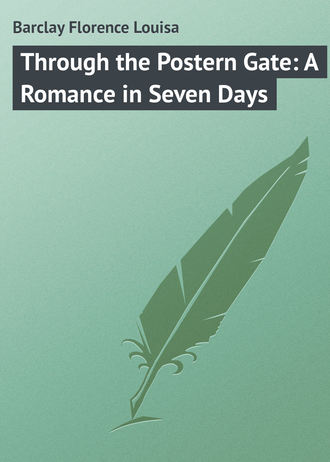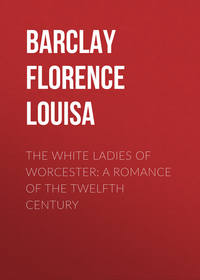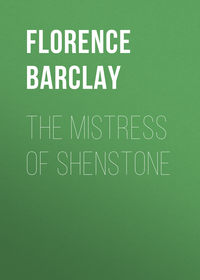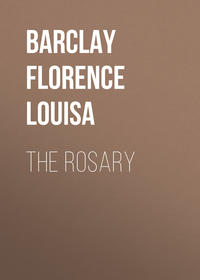 полная версия
полная версияThrough the Postern Gate: A Romance in Seven Days
The Boy smiled. "Did you think me a lazy beggar?" he asked. "I wasn't really, you know. I did quite a good deal of all kinds of things. But I didn't want to get played out. I wanted to do things all the rest of my life. Fellows who grind at college and come out Senior Wranglers, begin and end there. You don't hear of 'em again."
"I see," said Miss Charteris, amusement in her eyes. "So you felt it wisest to avoid being Senior Wrangler?"
"Just so," said the Boy. "I was content with a fairly respectable B.A. and I hope you saw me take it. How rotten it is, going up in a bunch, all hanging on to an old chap's fingers."
"Boy, Boy! I know all about you! You wasted golden opportunities; you declined to use your excellent abilities; you gave the authorities an anxious time. You were so disgracefully popular, that everybody thought your example the finest thing to follow, and you were more or less responsible for every lark and row which took place during your time."
The Boy did not smile. He looked at her, with a quaint, innocent seriousness, which made her feel almost uncomfortable.
"Dear," he said, "I had plenty of money, and heaps of friends, and I wanted to have a good time. Also I wanted all the other fellows to have a good time; and I enjoyed getting the better of all the old fogies who had forgotten what youth was like – if they'd ever known it. And I had no mother to ask me questions, and no sisters to turn up at my rooms unexpectedly. But I can tell you this, Christobel. I hope to be married soon; and I hope to marry a woman so sweet and noble and pure, that her very presence tests a man's every thought, feeling, and memory. And I can honestly look into your dear eyes and say: My wife will be welcome to know every detail of every prank I ever played in Cambridge; nor is there a thing in those three years I need feel ashamed of her knowing. There! Will that do?"
Miss Charteris threw out a deprecatory hand. "Oh, Boy dear!" she said. "I never doubted that. My Little Boy Blue, don't I know you? But I cannot let you talk as if you owe me any explanations. How curious to think I saw you so often during those years, yet we never actually met."
The Boy smiled. "Yes," he said, "we were all awfully proud of you, you know. What was it you took at Girton?"
Miss Charteris mentioned, modestly, the highest honours in classics as yet taken by a woman. The Boy had often heard it before. But he listened with bated breath.
"Yes," he said, "we were awfully proud of it, because of your tennis, and because of you being – well, just you. If you had been a round-shouldered little person in a placket, we should have taken it differently. We always called you 'The Goddess,' because of your splendid walk. Did you know?"
"No, Boy, I did not know; but I confess to feeling immensely flattered. Only, take a friend's advice, and avoid conversational allusions to plackets, because you are obviously ignorant of the meaning of the word. And now, tell me? Having successfully escaped so serious a drawback to future greatness as becoming Senior Wrangler, on what definite enterprise have you embarked?"
"Flying," said the Boy, sitting forward in his chair. "I am going to break every record. I am going to fly higher, farther, faster, than any man has ever flown before. This week, if I had not stayed on here – you know originally I came up only for the 'May week' – I was to have done a Channel flight. Ah, you don't know what it means, to own three flying-machines, all of different make, and each the best of its kind! You feel you own the world! And then to climb into your seat and go whirling away, with the wonderful hum in your ears, mastering the air – the hitherto invincible air. May I tell you what I am going to do for my next fly? Start from the high ground between Dover and Folkestone; fly over the Channel; circle round Boulogne Cathedral – you remember the high dome, rising out of the old town surrounded by the ramparts? Then back across the Channel, and to ground again at Folkestone; all in one flight; and I hope to do it in record time, if winds are right."
"And if winds are wrong, Boy? If you rush out and take the horrid risks of the cross-currents you told us about? If something happens to your propeller, and you fall headlong into the sea?"
"Oh, it's all U P then," said the Boy, lightly. "But one never expects that sort of thing to happen; and when it does, all is over so quickly that there is no time for anticipation. Beside, there must be pioneers. Every good life given, advances the cause."
Christobel Charteris looked at him. His was not the terrible, unmistakable, relentless face of the bird-man. He was brilliant with enthusiasm, but it was the enthusiasm of the sportsman, keen to excel; of Young England, dauntless, fearless, eager to break records. The spirit of the true bird-man had not, as yet, entered into her Little Boy Blue.
She pressed her hand upon her bosom. It ached still.
"Boy dear," she said, softly. "Has it ever struck you that, if you marry, your wife – whoever she might be – would most probably want you to give up flying? I cannot imagine a woman being able to bear that a man who was her all, should do these things."
The Boy never turned a hair! He did not bound in his seat. He did not even look at her.
"Why, of course, dear," he said, "if you wished it, I should give up flying, like a shot, and sell my aeroplanes. I know plenty of chaps who would like to buy them to-morrow. And I'll tell you what we would do. We'd buy the biggest, most powerful motor-car we could get, and we'd tear all over the country, exceeding the speed-limit, and doing everything jolly we could think of. That would be every bit as good as flying, if – if we did it together. I say, Christobel – do you know how to make a sentence of 'together'? Just three words: to get her! That's what 'together' spells for me now."
Miss Charteris smiled. "You might have taken honours in spelling, Boy. And I am not the sort of person who enjoys exceeding speed-limits. Also I am afraid I have a troublesome habit of always wanting to stop and see all there is to see."
But the Boy was infinitely accommodating. "Oh, we wouldn't exceed the speed-limit – much. And we would stop everywhere, and see everything. You should breakfast in London; lunch at the Old White Horse, Mr. Pickwick's inn at Ipswich; have tea at the Maid's Head, beneath the shadow of Norwich Cathedral, where you could wash your hands in Queen Elizabeth's fusty old bedroom – what a lot of bedrooms Queen Elizabeth slept in, and made them all fusty – and have time to show me Little Boy Blue's breakwater at Dovercourt, before dinner. There's nothing like motoring!"
"It sounds interesting, certainly," said Miss Charteris.
"And then," continued the Boy, in a calm business-like voice, "it's less expensive than flying. You run through fifty thousand a year in no time with aeroplanes. And of course we should want to open both my places. I'm awfully glad I didn't let the tenants in the old home renew their lease. As it is, they turn out in three months. Oh, I say, Christobel, I do believe it is a setting worthy of you. Have you ever seen it? The great hall, the old pictures, the oak staircase – I once rode down it on my rocking-horse and came to utter smash. And outside – the park, the lake, the beech avenue, the rose-garden, the peacocks. And a funny little old village belongs to us. Think how the people must want looking after. I believe you would like it all – I really believe you would! And think, ah, just think what it would be to me, to see my own splendid wife, queen over everything in my dear jolly old home! Hullo! – Hark to all the clocks! What is that striking? Seven? Oh, I say! I'm dining with the Master to-night. I must rush off, and change. Though I was such a bad lot, they all seem quite pleased to see me again. Really they do! Have I stayed too long? … Sure? … May I come to-morrow? … You are most awfully good to me. Good-bye."
And the Boy was gone. He had held her hand, in a firm, strong clasp, a second longer than the conventional handshake; his clear eyes, exactly on a level with hers, had looked at her gravely, wistfully, tenderly; and he was gone.
She walked slowly up the lawn. She must write a few letters before post time; then dress for her solitary dinner.
She felt a little flat; quite without cause. What could have been more satisfactory, in every way, than the Boy's visit; in spite of his absurd castles in the air? These must be tactfully demolished to-morrow. To-day, it was wisest just to let him talk.
Poor Little Boy Blue! Instead of the walls of Jericho falling, his own castles in the air would come tumbling about his ears. Poor Little Boy Blue!
She felt she had been completely mistress of the situation to-day, holding it exactly as she wished it to be. There was no need to fear the remaining days.
And when the seven days were over – what then? … She certainly felt very flat this evening. How suddenly the Boy had gone! There was still so much she wanted to say to him… And to-morrow was the Professor's afternoon. Mercifully, he never stayed later than four o'clock. It was to be hoped the Boy would not turn up early! But there was never any knowing what the Boy would do.
She smiled as she mounted the flight of stone steps, and passed into the house.
And, outside the postern gate, the Boy threw up his cap, and caught it; then started off and sprinted a hundred yards; then, turning aside, leapt a five-barred gate, and made off across the fields. When he pulled up at last, in his own bedroom, he had just time to tub, shave, and wrestle with his evening clothes. He communed with himself in the few moments of enforced stillness, while he mastered his tie.
"That was all right," he said. "I jolly well worked that all right! There was nothing to frighten her to-day – not a thing. Dear lips! They never trembled once; and no more turning faint. And, my Goody, how she lectured me! I wonder who's been telling her what. I know why she did it too. She wanted to feel quite sure she was bossing the show. And so she was, bless her! But I marched round! Yes, I jolly well marched round… Oh, I say! Can't you stop where I put you?" This, to his tie.
Then, with her golden rose in his button-hole, fastened by the pin from his flannel coat, off went the Boy to dine with the Master of his college.
"And the evening and the morning were the second day."
THE THIRD DAY
THE BOY INVADES THE KITCHEN
The Boy sat on a corner of the kitchen table, swinging a loose leg, and watching Martha make hot buttered-toast.
He had arrived early, and, finding no one in the garden, had entered the house by the garden-door, to pursue investigations upstairs.
On the mat in the hall he saw a pair of goloshes; in the umbrella-stand, a very large, badly-rolled umbrella; hanging on a peg near by, a professor's cap and gown.
The Boy stood stock still in the middle of the little hall, and looked at the goloshes.
Then from the drawing-room, through the closed door, came the voice of Miss Charteris – full, clear, measured, melodious – reading Greek tragedy.
érrois anaidés, én táchei neanía declaimed Miss Charteris; and the Boy fled.
Arrived in the kitchen, he persuaded Martha that cigarette smoke was fatal to black-beetles. He went about, blowing fragrant clouds into every possible crack and cranny. Martha watched him, out of the corner of her eye, crawling along under the dresser in his immaculate white flannels, and Martha blessed her stars that her kitchen floor was so spotlessly clean. Only this morning she had remarked to Jenkins that he could very well eat his dinner off the boards. Mercifully, Jenkins – tiresome man though he usually was – had not taken this literally; or he might have made the floor less fit for the Boy's perambulations.
Having taken all this trouble in order to establish his unquestioned right to smoke in Martha's kitchen, and to pose as a public benefactor while so doing, the Boy seated himself on the edge of the table, exactly behind Martha; lighted a fresh "Zenith," and prepared to enjoy himself.
Martha glanced nervously at the smoke, issuing from cracks and holes on all sides. It gave her a feeling that the house was on fire. Of course she knew it was not; but to feel the house is on fire, is only one degree less alarming than to know it is. However, beetles are nasty things; and the condescending kindness and regard for Martha's personal comfort, which crawled about after them in white flannels, was gratifying to a degree.
So Martha turned and gave the Boy one of her unusual smiles. He was very intently blowing rings – "bubbles" Martha called them afterwards, when explaining them to Jenkins; but that was Martha's mistake. They were smoke rings. It was one of the Boy's special accomplishments. He was an expert at blowing rings.
Presently: – "Martha, my duck – " he said suddenly.
Martha jumped. "Bless us, Mr. Guy! What a name!"
"What's the matter with it?" inquired the Boy, innocently. "I consider it a very nice name, and scriptural."
"Oh, I didn't mean m' own name," explained Martha, more flushed than the warmth of the fire warranted. "Not but what m' godfathers and godmothers might well 'ave chosen me a better."
"Oh, don't blame them, overmuch, Martha," said the Boy, earnestly. "You see their choice was limited. If you study your catechism you will find that it had to be 'N' or 'M' – 'Naomi' or 'Martha.' Even at that early age, they thought you favoured 'Martha' rather than 'Naomi'; so they named you 'Martha.'"
"Well I never!" exclaimed Mrs. Jenkins. "'N' or 'M'! So it is! Now I never noticed that before. We live and learn! And Jenkins – silly man – 'as always bin annoyed that they named 'im 'Noah.' But how about when you was christened, Mr. Guy?"
"Oh," explained the Boy, with a wave of his cigarette, "I was christened a bit later than you, Martha; and, by that time, Parliament had sat in solemn convocation, and had brought in a Bill to the effect that all needless and vexatious limitations and restrictions in the Prayer Book might for the future be disregarded. The first to go was 'N' or 'M.'"
"Well, I never!" said Martha. "I wish they'd ha' done it afore my time."
"You see," expounded the Boy, who was enjoying himself vastly, and getting the conjunction of the goloshes and the Greek play off his mind; "you see, Martha, those progressive Bills, intimately affecting the whole community, of vital importance to the nation at large, are always blocked by the House of Lords. If the Commons could have had their own way, you might have been named 'Lucy' or 'Clara.'"
"I don't incline to 'Lucy' or 'Clara,' sir," said Mrs. Jenkins, decidedly; "being, as they always strikes me, sickly story-book sort of names; but I do like justice and a free country! I always have felt doubtful o' them Lords, since I listened to my married niece's husband, a very respectable journeyman tailor but mostly out of work; and if it's their doing that I'm 'Martha,' well, I shall know what to do with Jenkins's vote – that's all!"
The Boy slapped his leg and rocked. "Martha, you ought to be put up to speak at political meetings. That's the whole thing in a nutshell: cause, effect, results, arguments, everything! Oh, my wig! – Yes, they are a lot of old stick-in-the-muds in the Upper House, aren't they?" pursued the Boy – who had had a long line of dignified ancestors in that much abused place; had an uncle there at the present moment, and was more than likely eventually to have to sit there himself – "a rotten lot of old stick-in-the-muds, Martha; but I think they did well by you. I'd give them the benefit of Jenkins's vote. I really would. I am glad they chose 'M,' not 'N.' Naomi was a widow and dismal. She never made the smallest effort to buck up. But Martha was a nice person; a bit flurried perhaps, and hot-tempered; but well up in cooking, and keen on it. I like Martha."
The Boy sat and meditated. Why did she read Greek plays with a person who left goloshes on the mat, and brought out an ancient umbrella with a waist, on an absolutely cloudless day?
"It wasn't m' own name surprised me, Mr. Guy, sir," remarked Martha, coyly; "it was the name you was pleased to hadd."
The Boy pulled himself together. "Eh, what? Oh, 'Martha, my duck'? I see. I hope you don't mind, Martha. It seemed to me rather a suitable and pretty addition to 'Martha.' You see, yours is a name which cannot be shortened when one feels affectionate. 'Sarah' can be 'Sally'; 'Amelia' can be 'Milly'; 'Caroline' can be 'Carrie'; but 'Martha' remains 'Martha' however loving people feel. What does Jenkins call you when he feels affectionate?"
Martha snorted. "Jenkins knows 'is place," she said, jerking the round lid off the stove, and putting on the kettle.
"Jenkins is a model," smiled the Boy.
Then Martha looked round, her feminine curiosity, and perhaps a touch of jealousy, getting the better of her respectful discretion. She had seen so much, and heard so little; and she was a very old family servant.
"What do you call her, Mr. Guy?" she asked, in a confidential whisper, with a jerk of the head toward the mulberry-tree.
"Her?" repeated the Boy, surprised. Then his whole tone softened. It was so sweet to speak her name to some one. "I call her 'Christobel,'" he said, gently.
But Martha wanted to know more. Martha was woman enough to desire an unshared possession of her own. She bent over the fire, stirring it through the bars.
"Mr. Guy, sir, I suppose you don't – I suppose you do – that is to say, sir – Do you call her what you've been pleased to call me?"
"Eh, what?" said the Boy, vaguely.
"Oh, I see. 'Christobel, my – ' Oh, no, Martha. No, I don't! Not even when I feel most affectionate." Here the Boy was seized with sudden convulsions, slapped his knee noiselessly, and rocked on the kitchen table. He whispered it, in an ecstasy of enjoyment. "'Christobel, my duck!' Oh, lor! 'Christobel, my duck!' I hope I shall be able to resist telling her. I should have to own I had called Martha so. 'Christobel, my – '"
Martha, wondering at the silence, looked round suddenly. But the Boy had that instant recovered, and was sitting gravely on the corner of the table.
"Martha, my duck," he said, "to return to the original opening of this conversation: has Jenkins ever told you what a nice little wisp of hair you have, behind your left ear?"
"Get along, sir!" retorted Martha, fairly blushing. "You're making game of me."
"Indeed, I'm not," said the Boy, seriously. "If you made it into a curl, Martha, and fastened it with an invisible pin, it would be quite too fascinating. You ask Jenkins. I say, Martha? What's a placket?"
"A placket, sir," said Martha, on her way to fetch something from a shelf near which hung the kitchen mirror; "a placket, sir, is a thing which shows when it shouldn't."
"I see," said the Boy. "Then you couldn't exactly go about in one. Martha, whose goloshes are those, sitting on the mat in the hall?"
Martha snorted. "An old woman's," she said, wrathfully.
The Boy considered this. "And does the umbrella with the waist belong to the same old woman?"
Martha nodded.
"And the Professor's cap and gown, hanging near by?"
Martha hesitated. "'Tain't always petticoats makes an old woman," she said, sententiously.
"Martha, you are pro-foundly right," said the Boy. "Does the Professor stay to tea?"
"Thank goodness no, sir. We draw the line at that, 'cept when Miss Hann comes too."
"Who is Miss Hann?"
"She's the Professor's sister." Martha hesitated; poured hot water into the silver teapot; then turned to whisper confidentially, with concentrated dislike: "She's always a-hegging of 'em on!"
"What a curious occupation," remarked the Boy, blowing a smoke-ring. "Does Miss Hann come often?"
"No, Mr. Guy. Thanks be, she's a hinvalid."
"Poor Miss Hann. What's the matter with her?"
Martha snorted. "Fancies herself too much."
"What a curious complaint. What are the symptoms?"
"Fancies herself in a bath-chair," said Martha, scornfully.
"I see," said the Boy. "Oh, poor Miss Hann! I should feel very sick if I fancied myself in a bath-chair. I wish I could meet Miss Hann. I should like to talk to her about the hegging-on business."
"You'd make her sit up," said Martha, with spiteful enjoyment.
"Oh no, I shouldn't," said the Boy. "That would not be kind to an invalid. I should see that she reclined, comfortably; and then I should jolly well flatten her out."
At that moment a shadow fell across the sunny window. Miss Charteris, her guest having departed, passed down the garden steps, and moved across the lawn.
The Boy sprang to his feet. At sight of her, his conscience smote him that he should have thus gossiped and chaffed with old Martha. He suddenly remembered why he had originally found his way to the kitchen.
"Martha," he said; "I want you to let me carry out the tea-tray this afternoon. She doesn't know I am here. She will think it is you or Jenkins, till she looks round. Let me carry it out, Martha, there's a duck!"
"As you please, sir," said Martha; "but if you want her to think it's Jenkins, you must put it down with a clatter. It takes a man to be clumsy."
The Boy walked over to the window. The mulberry-tree was not visible from the kitchen table.
"Don't go there, Mr. Guy!" cried Martha. "Miss Christobel will see you, sir. This window, and the pantry, show from the garden. If you want to 'ave a look at her, go through that door into the storeroom. The Venetian blind is always down in there. There is one crack through which I – "
Martha stopped short, disconcerted.
"One crack through which you think I could see? Thank you, Martha," said the Boy, readily. "Hurry up with the tray."
He went into the store-room; found Martha's chink, and realized exactly what had been the extent of Martha's view, during the last two days.
Then he bent his hungry young eyes on Christobel.
She was seated in a garden chair, her back to the house, her face towards the postern gate in the old red wall at the bottom of the garden. The rustic table, upon which he would soon deposit the tea-tray, was slightly behind and to the left of her. The sun shone through the mulberry leaves, glinting on the pure whiteness of her gown. She leaned her beautiful head back wearily. Her whole attitude betokened fatigue. He could not see her face; but he felt sure her eyes were open; and he knew her eyes were on the gate.
The Boy's lips moved. "Christobel," he whispered. "Christobel – belovèd?"
She was waiting; and he knew she was waiting for him.
Presently he dropped the lath of the Venetian blind, and turned to go. But first he took out his pocket-book and fastened the lath which lifted most easily, to those above and below it, with halfpenny stamps. He knew old Martha would take a hint from him. There must be no eyes on the mulberry-tree to-day.
In the kitchen the tray was ready; tea freshly made, thin bread-and-butter, cucumber sandwiches; hot buttered-toast in perfection; cornflour buns, warranted to explode; all the things he liked most; and, best of all, cups for two. He grasped the tray firmly with both hands.
"Martha," he said, "you are a jewel! I give you leave to watch me down the lawn from the kitchen window. But when I have safely arrived, turn your attention to your own tea, or I shall look up and shake my fist at your dear nice old face. And, I say, Martha, do you ever write postcards? Because, if you want any ha'penny stamps, you will find some on the storeroom blind. Only, don't want them, Martha, till this week is over, and I am gone."
Whereupon the Boy lifted the tray, and made for the door.
Down the lawn he bore it, and set it safely on the rustic table. He was very deft of movement, was the Boy; yet, remembering his instructions, he contrived to set it down with something of a clatter.
Miss Charteris did not turn her head Her eyes, half closed beneath the long lashes, were on the postern gate.
"Jenkins?" she said.
"Yes, ma'am," replied the Boy, in excellent imitation of the meek tones of Jenkins.





